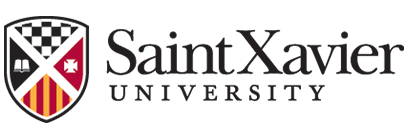
SXU Biology Professor Makes Semi-Finals in XPRIZE Rapid COVID Testing Competition
Saint Xavier University (SXU) biology professor Sarah Ware, Ph.D., is part of a team that has made it into the semi-finals of the XPRIZE competition, a competition to develop rapid, affordable and easy-to-use COVID-19 testing methods. The competitors' goal is to develop innovative, scalable testing solutions that will help society safely reopen. Winning teams create COVID-19 tests that are radically affordable compared to other tests on the market. The tests, though more affordable, will be equal to or better than commercial offerings at measuring sensitivity, specificity and limit of detection, with a quick results turnaround time of 12 hours or less.
Ware first learned about the competition after joining a collaborative open source platform called Just One Giant Lab (JOGL), where she became involved with the COVID-19 Diagnostic and Detection Challenge and joined a group interested in developing nucleic acid amplification diagnostic tests for the detection of SARS-CoV-2. She collaborated with Ellen Jorgensen with Aanika Biosciences in New York and Chris Monaco, who works for the Centers for Disease Control and Prevention (CDC) in Atlanta.
"We figured if we could develop a test that can be reproduced across three labs in different parts of the country with different equipment and resources, then our test should be readily reproducible and accessible in other labs as well," said Ware.
When Ware's group began working on developing their test, they worked with an international group of people on JOGL, where they would discuss testing protocols, upload articles and information, and analyze pre-prints, which are formatted like peer-reviewed journal articles (though not peer-reviewed) and allow for rapid dissemination of new information, something that is critical during a pandemic. After discussions, the groups work to reproduce protocols they think may be robust. Though sometimes only small improvements can be gleaned from a pre-print, it is the small improvements that led them to current testing protocols. They also dialog directly with product development managers and scientists at companies that sell components of their tests.
For Ware's group's test, they decided to combine three commercially available products. Criteria included ensuring the kit would be deployable as soon as possible, contained a buffer that would inactivate a virus present and stabilize viral RNA (ribonucleic acid that carries genetic information in some viruses) until testing is done, and had components that will continue to be available (to avoid shortages of components).
"The development of this test has definitely been a unique, collaborative and productive process, and it serves as an amazing model for future research," said Ware.
Ware's team is dedicated to open source sharing and has no plans to patent any part of their test or keep any information hidden. The team has been mainly funded through mini-grants from the AXA Research Fund. They are competing against many other teams that represent commercial biotech companies, some of which have already received FDA Emergency Use Authorization (EUA) and provisional patents, but Ware's test is performing at the same or better sensitivity compared to tests already approved by the FDA. Ware's test takes one hour from sample collection to final result, and colorimetric results can be read with the naked eye. The test is safe, sensitive, inexpensive, and the only equipment needed are pipettes and a sous vide precision cooker. With no centrifugation steps, it's scalable via automation using robots.
"We need better science communication and interfacing with the general public, and members of the general public need to be more proactive in reaching a baseline understanding of the scientific facts surrounding how the SARS-CoV-2 virus is spread and what measures help stop the spread," said Ware.
Being in the semi-finals gives Ware's team an opportunity to validate their protocol in a blinded proficiency test. They hope to be one of the 20 teams to advance to the finals because then their test can be further validated using clinical samples. The top five winning groups will get to then test at least 500 people per week over the course of a few months.
"The way we have developed this test via open source sharing of ideas and information will serve as a model for fruitful and collaborative research," said Ware.
Ware, who also teaches at Benedictine University and College of DuPage, has a background in genetics, microbiology, biotechnology and molecular biology, and she leads hands-on workshops at schools, museums, clubs, and Maker Faire events. Ware is a strong advocate for open source sharing of scientific information and for the democratization of science. She's spoken at TedXNaperville, Def Con Biohacking Village, Soapbox Science, Pechakucha and Biohack the Planet, and is on the organizing committee for the annual Global Community Bio Summit. Ware is also the founder of BioBlaze Community Bio Lab, the first and still only community lab of its kind in Illinois. BioBlaze is a fully functional lab with centrifuges, thermal cyclers, an autoclave, a laminar flow hood, beakers and chemicals that members of the general public can use to perform original biological experiments.
To learn more about Ware's team's One-Hour COVID Test, visit their project page on JGOL, join the discussion on Facebook or watch a video of the testing protocol on YouTube.

